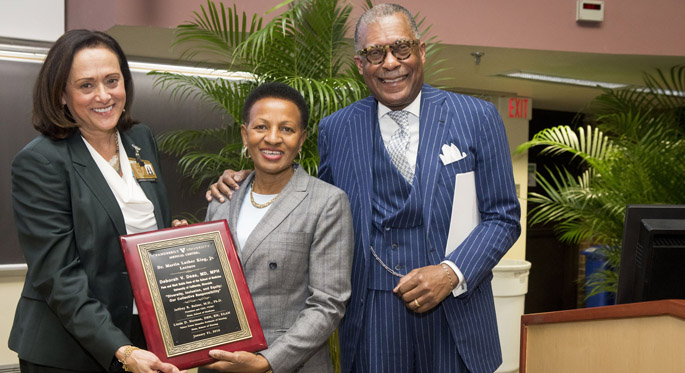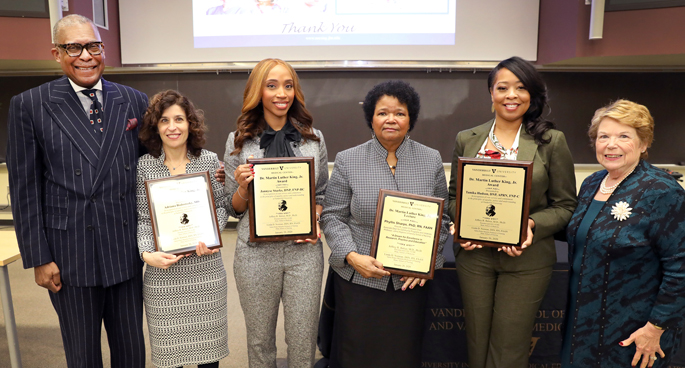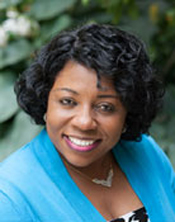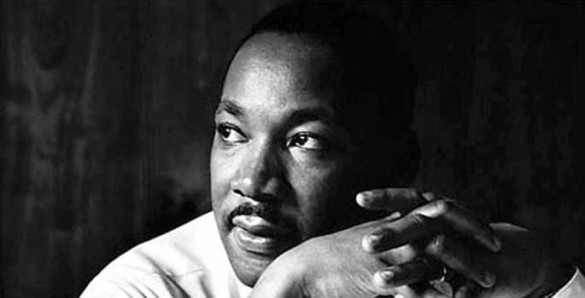
by Kathy Whitney
The 19th annual Martin Luther King Jr. Commemorative Lecture was held on Monday and commenced with the United Voices of Vanderbilt choir’s stirring rendition of “The Battle Hymn of the Republic.”
“We do this every year to try to reconnect with the vision and work of Dr. Martin Luther King Jr.,” said André Churchwell, MD, chief diversity officer for VUMC, in welcoming the crowd. “We do it to think about the areas of civil rights and social justice that we’re all about here at the Medical Center. We gather every year as a call to our VUSM and VUMC communities to recommit ourselves to the work of health disparities in everything we do.”
Jana Lauderdale, PhD, RN, presented the 2019 Martin Luther King Jr., Award to Janet Rachel, talent operations program manager in Human Resources, and Sonya Reid-Lawrence, MD, clinical fellow in hematology/oncology, citing their commitment to diversity and inclusion within the Vanderbilt community through their work and volunteer commitments beyond campus.
Vanderbilt University Schools of Medicine and Nursing, in conjunction with the 2019 Martin Luther King Jr. Commemorative Series, presented keynote speaker Deborah Deas, MD, MPH, professor of Psychiatry and the Pam and Mark Rudin Dean of the School of Medicine and chief executive officer for clinical affairs at the University of California, Riverside.
Deas spoke on the topic of “diversity, inclusion and equity: our joint responsibility.”
Deas grew up in the rural town of Adams Run, South Carolina, the daughter of a farmer and a domestic cook. Living 30 miles from the closest health care facility, Deas spoke with first-hand knowledge of health disparity.
“I didn’t see a physician who looked like me until I was in college,” Deas said.
She earned her Bachelor of Science degree from the College of Charleston in 1978 and her Master of Public Health (MPH) and her MD from the Medical University of South Carolina.
“When we think about health disparities, it’s that which we refer to as having higher burden of illness, injury, disability and mortality that is experienced by one population group to another group,” Deas said. “While there are multiple factors that influence our health and health care, the social determinants … have a great impact on what happens to individuals regarding their health.”
Prior to being named dean and CEO at the University of California, Riverside, Deas served as senior associate dean for medical education, chief academic officer, senior associate dean for diversity and associate dean for admissions at the Medical University of South Carolina. In these roles, she had the opportunity to shine a light on disparity in health education and the workforce.
“I’ve found my focus has been the health care workforce, influenced by growing up in the South during the Civil Rights movement. While I was at the Medical University of South Carolina, I served in multiple roles that put me in a position to have an impact. With that impact I sought to make a difference.”
Policies were put into place, expectations were stated clearly and people came on board, she said. As a result, by 2017, the number of underrepresented minority (URM) students at MUSC increased from 12.6 percent to 19 percent; URM residents increased to 14 percent, and URM faculty increased from 4 to 7 percent.
In her address, Deas challenged her colleagues — the deans of the 150 U.S. medical schools — to strengthen their pipelines of URM students, beginning when they are in high school.
“What are we going to do about the health care workforce? Dr. King said, ‘Everybody can be great because everybody can serve.’ It means that we all can have a role in diversifying the health care workforce and embracing diversity and fostering inclusion,” she said.
The program concluded with George Hill, PhD, emeritus professor of Medical Education and Administration and Pathology, Microbiology and Immunology, leading the audience in “We Shall Overcome.”















